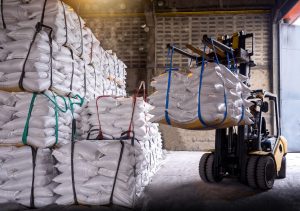In the APSA Public Scholarship Program, graduate students in political science produce summaries of new research in the American Political Science Review. This piece, written by Sienna Nordquist, covers the new article by In Song Kim, Megumi Naoi, and Tomoya Sasaki, “Domestic Institutions, Geographic Concentration, and Agricultural Liberalization“.
 With the Trump administration announcing new verbal trade deals on an almost daily basis, the flow of goods and services across borders is on everyone’s mind. One of the first new verbal commitments to be made public was the US-Japan deal. The agreement sets a baseline 15% tariff on Japanese exports, led to quick gains in both countries’ stock markets, and created a precedent for Japan to have a more favorable automotive trade with the US than traditional partners like Canada and Mexico. To key exporters in Japan and intermediary goods importers in the US, deals like this one can turn riches to rags and vice versa, depending on what and where industries are producing. In a recent APSR publication, In Song Kim, Megumi Naoi, and Tomoya Sasaki use the geographic concentration of agricultural goods to understand how a country’s constitutional structure shapes its capacity to make domestic compensation to losers in its trade policies. They find that parliamentary systems are more likely to liberalize trade for products that are highly geographically concentrated and to compensate the affected industries with subsidies than presidential systems.
With the Trump administration announcing new verbal trade deals on an almost daily basis, the flow of goods and services across borders is on everyone’s mind. One of the first new verbal commitments to be made public was the US-Japan deal. The agreement sets a baseline 15% tariff on Japanese exports, led to quick gains in both countries’ stock markets, and created a precedent for Japan to have a more favorable automotive trade with the US than traditional partners like Canada and Mexico. To key exporters in Japan and intermediary goods importers in the US, deals like this one can turn riches to rags and vice versa, depending on what and where industries are producing. In a recent APSR publication, In Song Kim, Megumi Naoi, and Tomoya Sasaki use the geographic concentration of agricultural goods to understand how a country’s constitutional structure shapes its capacity to make domestic compensation to losers in its trade policies. They find that parliamentary systems are more likely to liberalize trade for products that are highly geographically concentrated and to compensate the affected industries with subsidies than presidential systems.
A country’s constitutional structure¾whether or not it is parliamentary or presidential¾affects multiple aspects of a trade negotiation and adoption process. Since the same party leaders control the executive and legislative branches in a parliamentary system, the party negotiates the trade agreement at the same time it secures enough intra-party support for the bill. However, presidential systems have different officials with varying political incentives controlling the executive and legislative branches. These different interests can undermine the government capacity to deliver compensation to trade losers.
Parliamentary systems are more willing to liberalize geographically concentrated industries because it is easier for them to get a party consensus for subsidies applied towards the affected products. Presidential systems, on the other hand, are more likely to compensate diffused industries because a larger number of legislators can support legislation with the majority threshold.
“A democratic nation’s constitution influences how it negotiates trade agreements and whether or not certain industries receive compensating subsidies as a result.”The authors create a novel dataset of the product-level geographic concentration of agricultural goods in order to see how domestic institutions like presidentialism and parliamentarism affect trade liberalization. The authors focus on agricultural goods because the location of these industries depends more on climate and less on politics than other goods. They choose the case study of the sugar industries in the US and Japan because sugar is a highly concentrated agricultural product in both nations (in Florida and Louisiana in the US, and in Kagoshima and Okinawa in Japan). The authors find that parliamentary systems are significantly more likely to liberalize concentrated agricultural products than presidential systems. Parliamentary systems are also more likely to protect diffused agricultural products than presidential systems.
The authors supplement these findings with thorough qualitative studies. In conducting interviews with fifteen trade officials in both countries, they find confirmatory evidence that trade negotiations with the trade partner and for compensating domestic industries happen simultaneously in Japan, whereas the executive’s negotiation with the trade partner happens first and distinctly from the ratification process in the US. Moreover, Congressional members are unlikely to be willing to discuss what terms of trade they are and are not willing to accept with members of the executive, whereas Japanese members of parliament communicate the explicit tariff numbers they are expecting to party leaders.
As a whole, the results tell a new and fascinating angle of trade negotiation dynamics. A democratic nation’s constitution influences how it negotiates trade agreements and whether or not certain industries receive compensating subsidies as a result.
Sienna Nordquist is a 3rd year PhD Student in Social and Political Science at Bocconi University, Italy. She is also a visiting researcher at the WZB’s Transformations of Democracy Unit in Berlin, Germany. Originally from the US, Sienna was a Robert W. Woodruff Scholar at Emory University, received her Master’s degree from the LSE’s European Institute, and has been a Fellow at the Atlantic Council.
KIM, IN SONG, MEGUMI NAOI, and TOMOYA SASAKI. 2025. “Domestic Institutions, Geographic Concentration, and Agricultural Liberalization.” American Political Science Review, 1–17.
About the APSA Public Scholarship Program.


AloJapan.com